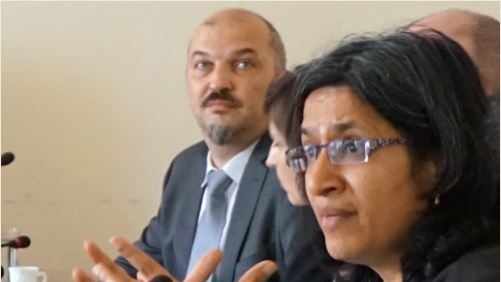World Bank Regional Director for Central Europe and the Baltic Countries highlighted Bulgaria’s potential for sustainable growth and shared prosperity
SOFIA, May 20, 2015 – World Bank Regional Director for Central Europe and the Baltic Countries, Mamta Murthi, today discussed with the Bulgarian Government how the international financial institution can help support Bulgaria over the next five years in its efforts to achieve sustainable growth and converge with EU living standards.
The meeting followed the regular Council of Ministers meeting, and was attended by all four Deputy Prime Ministers, namely Tomislav Donchev, Deputy Prime Minister for EU Funds and Economic Policy; Rumiana Buchvarova, Deputy Prime Minister for Coalition Policy and Public Administration and Minister of the Interior; and Meglena Kuneva, Deputy Prime Minister for European Policy Coordination and Institutional Affairs; and Ivailo Kalfin, Deputy Prime Minister for Demographic and Social Policies and Minister of Labor and Social Policy. Nine other ministers also contributed to the discussions, including ministers of Finance, Regional Development, Economy, Environment and Water, Education, Agriculture, Health, Transport, Justice, and Energy.
During the meeting, the World Bank team presented the key messages from the Bulgaria Systematic Country Diagnostic (SCD) report to the Bulgarian Government, namely:
- Growth in Bulgaria has slowed and convergence has become more challenging.
- With the current rate of productivity growth, Bulgarians will not have the EU standards of living within a generation.
- Bulgaria will need to tap several sources of growth for a faster, more inclusive, and, above all, economically and socially sustainable growth.
- Three transformational policy areas are proposed to turn the tide – governance, skills, and public spending.
The SCD report is currently being finalized, and is expected to be published in the coming weeks. It highlights policy ideas on how to achieve faster, more inclusive, and sustainable growth. The report argues that faster growth is possible with an improved business environment, better transport infrastructure, and a labor force with adequate skills. Parallel to this, inclusive growth requires more mobility and economic participation of the bottom 40 percent of the population, as well as more effective health care, social safety net, and pension systems. Sustainable growth could be achieved by safeguarding macroeconomic stability, but mainly by ensuring social stability in the country.
“We realize that addressing all challenges and issues at once is not realistic. That is why we tried to prioritize the efforts in support of National Reforms Program, and to suggest policy ideas in three areas that we believe can have transformational impact, such as improved governance, better skills, and more effective public spending,” said Mamta Murthi, World Bank Regional Director for Central Europe and the Baltic Countries. “Bulgaria could turn the tide and achieve faster, more inclusive, and sustainable growth that would work for all Bulgarians.”
According to Tomislav Donchev, Deputy Prime Minister for EU Funds and Economic Policy, “The Bulgarian government is committed to achieving sustained economic growth that would speed up EU convergence. As we strive to align with EU living standards, we will continue relying on the World Bank’s strategic advice and support over the next five years of the new EU programing period.”

